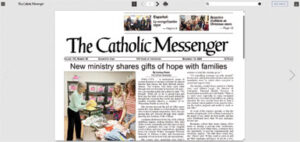 By Barb Arland-Fye
By Barb Arland-Fye
Editorial
On Aug. 12, U.S. Sen. Joni Ernst (R-Iowa), who chairs the Senate Committee on Small Business and Entrepreneurship, will host her third annual “Entrepreneur Expo” at Iowa State University in Ames. “The event gives unprecedented access to opportunities across the federal marketplace with valuable networking opportunities and hands-on instruction on how Iowa small businesses can sell to America’s largest consumer — the federal government,” a news release on her website states.
“This year’s expo theme is ‘Made in America,’ because innovation comes from the heartland and these opportunities should not be limited to Washington,” Ernst said. “I’m honored to connect Iowa’s entrepreneurs and job creators and provide them with the ins and outs of federal opportunities” (https://tinyurl.com/3mvy4fsj).
Iowa certainly needs a boost. The U.S. Bureau of Economic Analysis shows that since the third quarter of 2017, Iowa’s Gross Domestic Product (GDP) has fallen behind the U.S. GDP and the gap grows each year. In 2017 Q3, the U.S. GDP was 100.248 compared with Iowa’s GDP of 98.974. In 2025, Q1, the U.S. GDP was 119.891 compared with Iowa’s GDP of 106.234.
Research and development work hand in hand with innovation but U.S. Sen. Edward J. Markey (D-Mass.), a ranking member on the committee that Ernst chairs, said “devastating cuts to government agencies and research institutions” are “crushing American innovation.” He made that criticism in a July 25 news release following a committee hearing titled “Innovation in the Crosshairs: Countering China’s Industrial Espionage.”
He quoted Sujai Shivakumar, senior fellow at the Center for Strategic and International Studies, who spoke at the hearing. “When promising technologies aren’t developed or can’t reach scale because commercialization tools are underfunded, others will seize the opportunity,” she said. Small businesses, universities and government agencies foster a strong “innovation ecosystem that promotes investment in domestic research and development, including through the Small Business Innovation Research and Small Business Technology Transfer (SBIR/STTR) programs,” Markey said in his news release. He is calling for passage of legislation that would make permanent and expand the programs, which are set to expire Sept. 30 if Congress does not reauthorize them.
How are Catholics, in good faith, supposed to evaluate and advocate for an Iowa economy in which all Iowans can flourish? The Diocese of Davenport’s Social Action Office offers wise advice in its “Two Feet Social Action Newsletter” for July 2025.
Pope Leo XIV, in taking that name, appears to signal “that he aligns with the ideas of Rerum Novarum, the foundational document of Catholic social doctrine” that Pope Leo XIII wrote, the newsletter states. “While Pope Leo XIV hasn’t issued a formal statement on the Church’s social doctrine, his comments to date on fraternity, unity and the equality of all people continue in that vein,” Deacon Kent Ferris, diocesan director of Social Action, wrote. He recommends reading “Rerum Novarum” (https://tinyurl.com/2p9zehkb). The Holy Father’s insights remain relevant today, 134 years after he wrote the encyclical.
Another, particularly appropriate document is the U.S. Conference of Catholic Bishops’ pastoral letter, Economic Justice For All (https://tinyurl.com/9h4tsech), written nearly 40 years ago. The observations and recommendations contained in this letter offer us concrete action steps to take individually and communally.
“Every economic decision and institution must be judged in light of whether it protects or undermines the dignity of the human person,” the bishops said. “The pastoral letter begins with the human person. We believe the person is sacred — the clearest reflection of God among us. Human dignity comes from God, not from nationality, race, sex, economic status, or any human accomplishment. We judge any economic system by what it does for and to people and by how it permits all to participate in it. The economy should serve people, not the other way around.”
We need to address these questions the bishops raised in their pastoral letter:
- With what care, human kindness, and justice do I conduct myself at work?
- How will my economic decisions to buy, sell, invest, divest, hire, or fire serve human dignity and the common good?
- In what career can I best exercise my talents so as to fill the world with the Spirit of Christ?
- How do my economic choices contribute to the strength of my family and community, to the values of my children, to a sensitivity to those in need?
- In this consumer society, how can I develop a healthy detachment from things and avoid the temptation to assess who I am by what I have?
- How do I strike a balance between labor and leisure that enlarges my capacity for friendships, for family life, for community?
- What government policies should I support to attain the well-being of all, especially the poor and vulnerable?
The Entrepreneur Expo serves as a good reminder and starting point to begin addressing these questions.
Barb Arland-Fye, Editor
arland-fye@davenportdiocese.org









